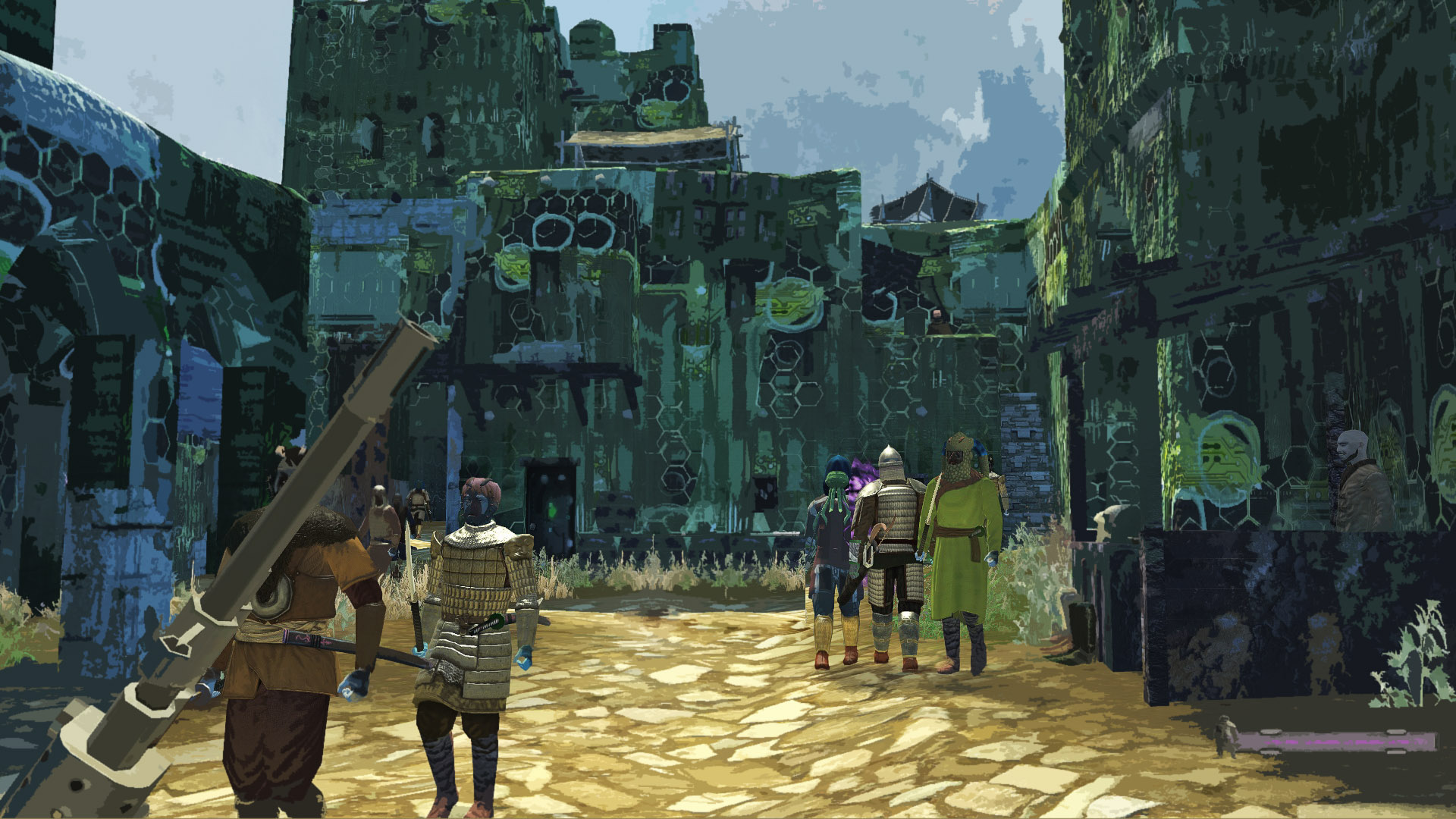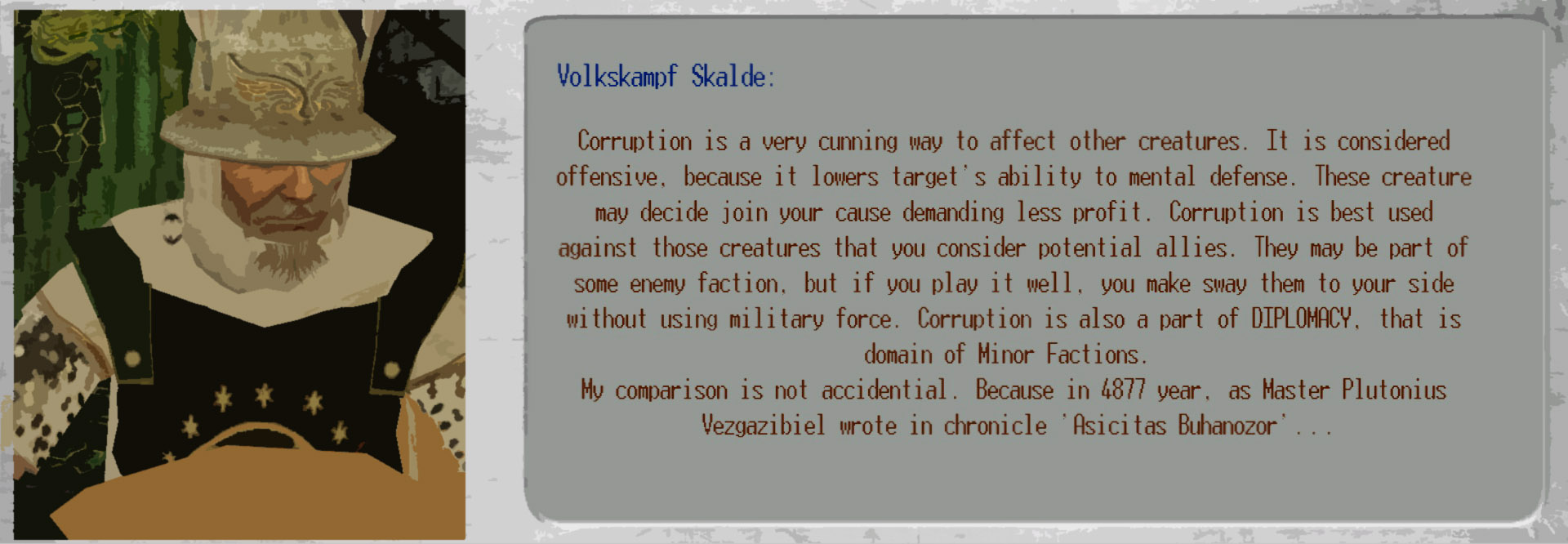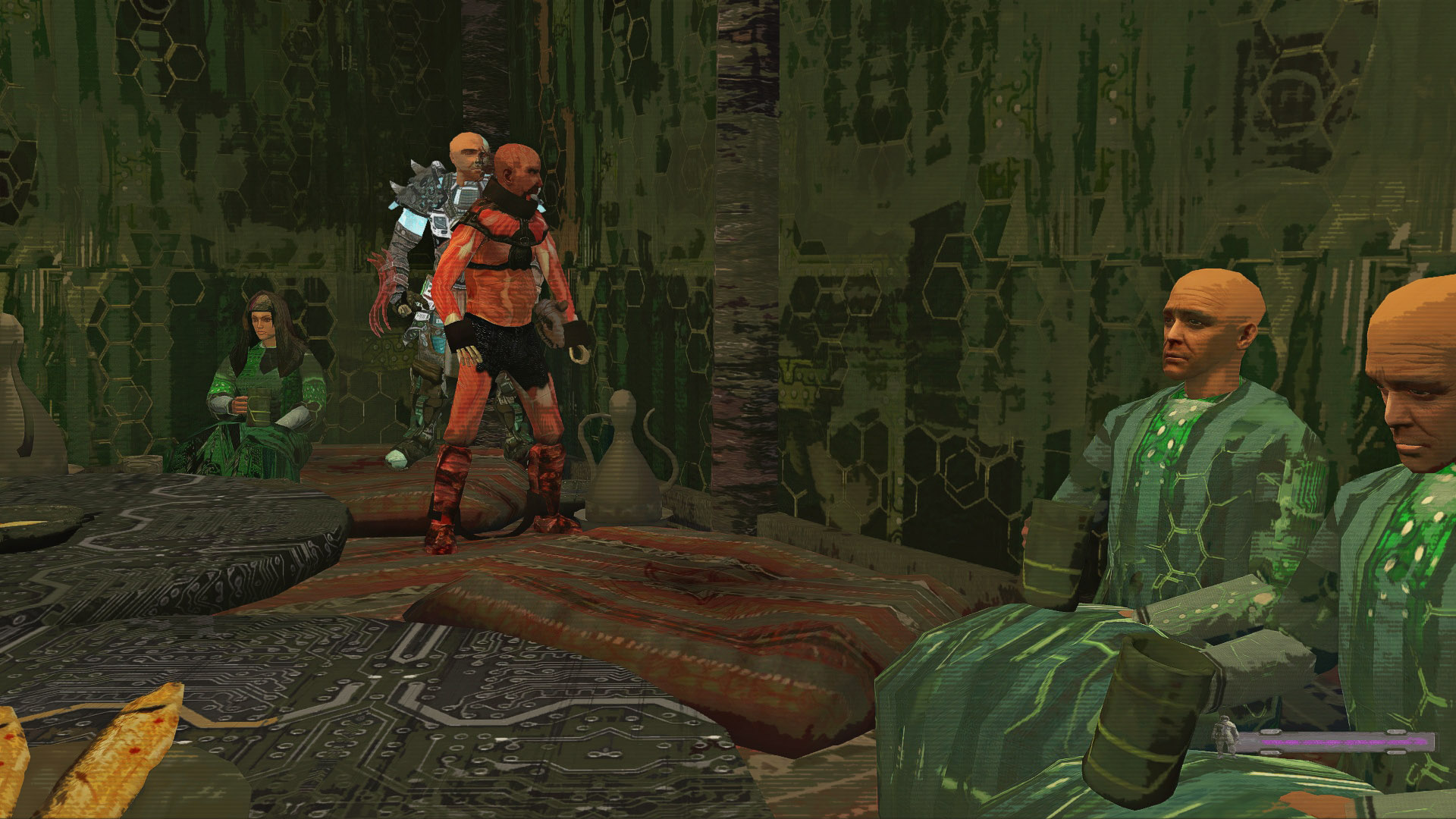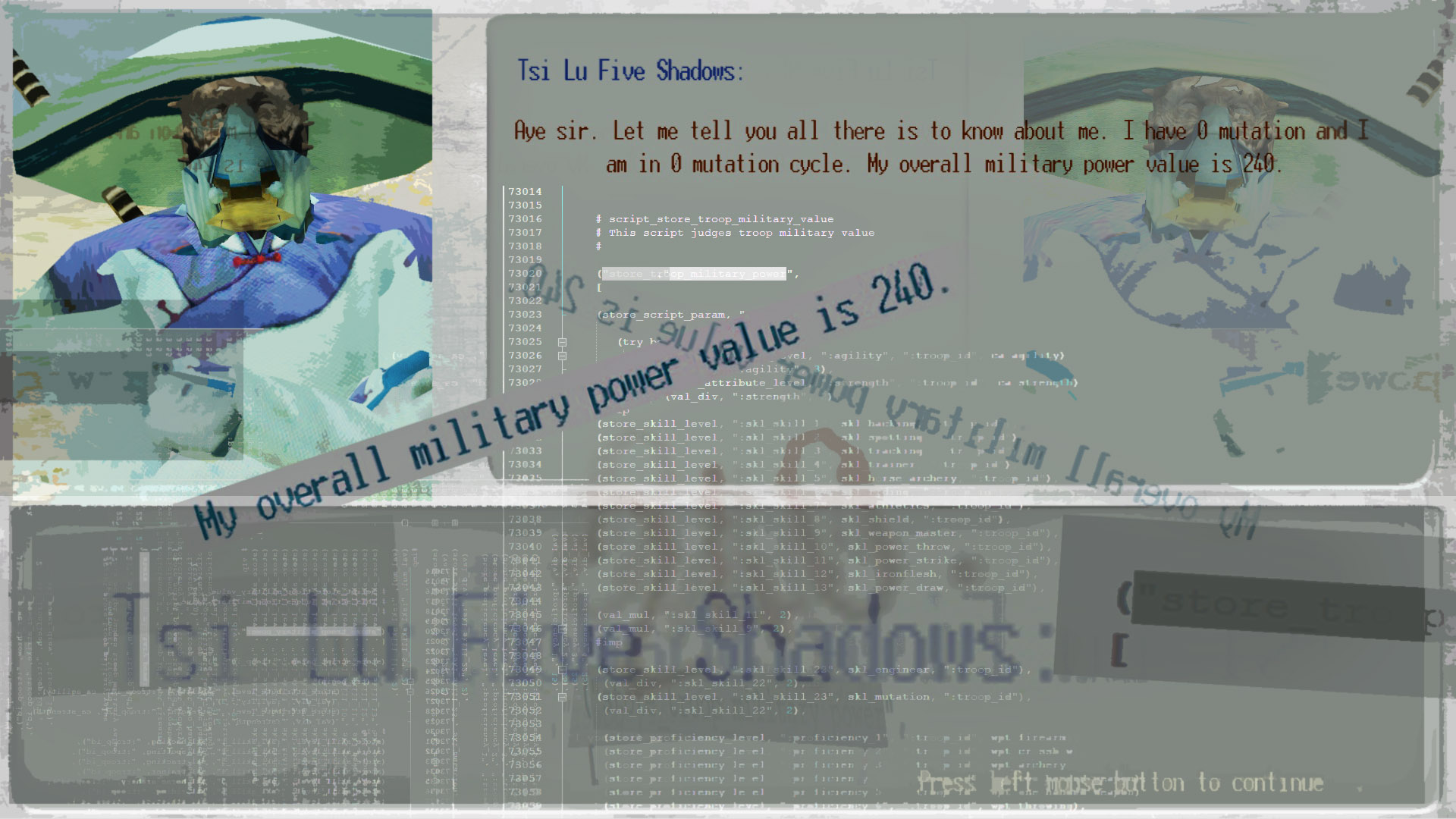Psychology


In Paradigm Worlds, all characters have personalities. Not just troops and heroes, but also merchants, tavernkeepers, travellers and lords alike.
All creatures go through the same steps as the player does during Character Creation, meaning they have a life's story of their own - their history, their origins, what they did as they grew up... These stories are generated at the start of every game, and even affect the characters' attributes and skills.
Players and characters have two characteristics, or philosophies, designating their values and how strongly they believe in them.
Most of the impact of a creature's personality on the world has much to do with checking whether or not two creatures like eachother - For example, personality may prevent companions from doing a mission if it goes against their belief.
And, of course, personality is a big part of roleplaying your character and immersing in the world.
All creatures go through the same steps as the player does during Character Creation, meaning they have a life's story of their own - their history, their origins, what they did as they grew up... These stories are generated at the start of every game, and even affect the characters' attributes and skills.
Players and characters have two characteristics, or philosophies, designating their values and how strongly they believe in them.
Most of the impact of a creature's personality on the world has much to do with checking whether or not two creatures like eachother - For example, personality may prevent companions from doing a mission if it goes against their belief.
And, of course, personality is a big part of roleplaying your character and immersing in the world.
Characteristics
Aristocratic
The belief in hierarchy, and the notion that nobility is predestined to rule over others.
Anarchist
The belief that hierarchy and authority are corrupt, and that law and privilege equals exploitation.
The belief in hierarchy, and the notion that nobility is predestined to rule over others.
Anarchist
The belief that hierarchy and authority are corrupt, and that law and privilege equals exploitation.
Egalitarian
The belief that all creatures are equal.
Evolutionist
The belief that there is no such thing as equality, but instead that some creatures are inherently born more powerful than others, are better suited to survival, and should use this to their advantage and profit.
The belief that all creatures are equal.
Evolutionist
The belief that there is no such thing as equality, but instead that some creatures are inherently born more powerful than others, are better suited to survival, and should use this to their advantage and profit.
Humanitarian
The belief that life is the most important value of all, and that we should do no harm unless it is in self-defense.
Honest
The belief that lies are poisonous, and that more good can be done with honestly and politeness. It is better to tell harsh truths than convenient lies.
The belief that life is the most important value of all, and that we should do no harm unless it is in self-defense.
Honest
The belief that lies are poisonous, and that more good can be done with honestly and politeness. It is better to tell harsh truths than convenient lies.
Manipulator
The belief that creatures are too stupid to accept the truth, and that manipulation is an art form.
Pious
The belief in the spiritual, and that we should act morally, and as though there were powers greater than anything material in this world.
The belief that creatures are too stupid to accept the truth, and that manipulation is an art form.
Pious
The belief in the spiritual, and that we should act morally, and as though there were powers greater than anything material in this world.
Materialist
The belief only in what you see and feel. You would choose science over religion.
Nihilist
The belief that life has never been cheaper than in our times, and you should only care about yourself, because no one else will.
The belief only in what you see and feel. You would choose science over religion.
Nihilist
The belief that life has never been cheaper than in our times, and you should only care about yourself, because no one else will.
You then select how strongly your character believes in these values - Are they fanatical? Sure? Doubtful?
Again, every character will believe in some things more strongly than others, and this can similarly affect negotiations.
In addition to two characteristics, every creature also has a nature.
Nature is important, especially for lords, as it has a significant impact on AI behavior.
For example, a martial creature will more eagerly support its king during a campaign. A cunning creature will get more money. A selfrighteous creature will rather save itself than jump into a dangerous fight to help a friendly army.
Players may expect some small profits from nature as well, as creatures with similar natures will help eachother more.
Natures
Martial
Warfare is your whole life.
Quarrelsome
You don't agree with anyone but yourself, and have many means of persuasion.
Warfare is your whole life.
Quarrelsome
You don't agree with anyone but yourself, and have many means of persuasion.
Selfrighteous
You like to take care of yourself first. You believe other creatures are selfish and unworthy, and may be the tools you will use to gain power in this world.
Cunning
You believe physical strength is nothing compared to the power of the mind. It is better to disable an enemy before it even gets to you - why fight and lose precious resources when you can outsmart your enemy first?
You like to take care of yourself first. You believe other creatures are selfish and unworthy, and may be the tools you will use to gain power in this world.
Cunning
You believe physical strength is nothing compared to the power of the mind. It is better to disable an enemy before it even gets to you - why fight and lose precious resources when you can outsmart your enemy first?
Debauched and Decadent
Your enemies call you a sadistic maniac. Your friends call you a genius.
Goodnatured
You get satisfaction from making others happy. You believe war is wrong, and we should peacefully resolve our conflicts.
Your enemies call you a sadistic maniac. Your friends call you a genius.
Goodnatured
You get satisfaction from making others happy. You believe war is wrong, and we should peacefully resolve our conflicts.
Upstanding
You believe justice has to be enforced for those who are too weak to fight for their cause.
Roguish
You believe that power comes from the exploitation of the weak. Life is hard enough when you're not taking what's yours. You believe that wise ones hide their nature, and that you have your own way of doing things. Live and let die.
You believe justice has to be enforced for those who are too weak to fight for their cause.
Roguish
You believe that power comes from the exploitation of the weak. Life is hard enough when you're not taking what's yours. You believe that wise ones hide their nature, and that you have your own way of doing things. Live and let die.
Benefactor
You believe we can all profit from doing good. Common folks work more efficiently when they're happy, cows give more milk when they're not hungry. Good rulers and good commanders are those who develop their country and culture, not those who only win battles. War is always a burden for the weak, and play for those in power. You believe we should seek common peace to build wealth and improve our status.
Custodian / Trader
Same description as Benefactor, for now.
Presumably a greedier, more money-focused version of the same belief.
You believe we can all profit from doing good. Common folks work more efficiently when they're happy, cows give more milk when they're not hungry. Good rulers and good commanders are those who develop their country and culture, not those who only win battles. War is always a burden for the weak, and play for those in power. You believe we should seek common peace to build wealth and improve our status.
Custodian / Trader
Same description as Benefactor, for now.
Presumably a greedier, more money-focused version of the same belief.

Negotiations
Negotiations are a new level of inter-creature relations. You can present your point of view, show your appreciation or disapproval, or otherwise help or harm a creature psychologically.
Attempt Profiling Character
The player can try to analyse another creature's character, past, and background. The more you know, the better the chances for successful negotiations. However, profiling is considered to be an insult, or even a threat.
Present Your Character
Tells the other creature something about yourself.
Positive Actions
Like [4], Friendship [6], Chill Out [9], Admire [12]
Negative Actions
Insult [-4], Frighten [-6], Corrupt [-7], Terror [-8], Malice [-9], Humiliate [-12]
[1.99.1] (UNRELEASED) adds Provoke which is a special action that, in addition to having an insulting effect, will make the creature challenge the player to a duel.
Numbers in brackets represent how difficult it is to suggest a given action.
These actions may affect both speakers' renown, controversy, sanity and honor.
By 'winning' negotiations (for which the Manipulation skill and Charisma stat are most helpful), players can enforce their point of view and their Paradigm.
It can be treated as psychological warfare. You can compromise your enemies in the eyes of the king, or you can be a strong king yourself and keep good relations with your vassals.
Of course, creatures are not stupid - if positive actions are proposed to a crature that hates the player, their response will likely be a negative one. It is not a strict rule, however. A creature can always think, "Well, if the player really wants to end our conflict after all, why not?"

Players can check "Present Psychological Profile" under the Personal Reports section of the Reports menu to inspect their own details. There are also some in-game tutorials in this menu to act as a refresher for these rules.

In most cases, you can also ask creatures about their military power.
The script for this analyses all attributes, all skills, and very closely takes a look at equipment. Machine guns and pistols automatically make troops a lot more powerful. Experience level is important, but equipment plays the largest role.
Military power is also useful during conversations. Creatures will disapprove of low quality equipment and weak speakers, and will be impressed by the opposite.
Controversy
The higher the value, the lower your chance to get a fief from a king. Controversial creatures are also generally less liked by others.
Sanity
Essentially acts as the maximum amount of relation your character can have with others. If you have 45 sanity, you will not be able to improve your relationship with a creature beyond 45.
Attempt Profiling Character
The player can try to analyse another creature's character, past, and background. The more you know, the better the chances for successful negotiations. However, profiling is considered to be an insult, or even a threat.
Present Your Character
Tells the other creature something about yourself.
Positive Actions
Like [4], Friendship [6], Chill Out [9], Admire [12]
Negative Actions
Insult [-4], Frighten [-6], Corrupt [-7], Terror [-8], Malice [-9], Humiliate [-12]
[1.99.1] (UNRELEASED) adds Provoke which is a special action that, in addition to having an insulting effect, will make the creature challenge the player to a duel.
Numbers in brackets represent how difficult it is to suggest a given action.
These actions may affect both speakers' renown, controversy, sanity and honor.
By 'winning' negotiations (for which the Manipulation skill and Charisma stat are most helpful), players can enforce their point of view and their Paradigm.
It can be treated as psychological warfare. You can compromise your enemies in the eyes of the king, or you can be a strong king yourself and keep good relations with your vassals.
Of course, creatures are not stupid - if positive actions are proposed to a crature that hates the player, their response will likely be a negative one. It is not a strict rule, however. A creature can always think, "Well, if the player really wants to end our conflict after all, why not?"

Psychostatus
"Psychostatus" is, as the name implies, a status effect that results from Negotiation. For instance, if an action of Friendship was used on a creature, then both speakers are in a good mood for a few days and every day they will gain some sanity or lose controversy. Inversely, negative actions like Corruption will cause a loss of sanity, honor or renown. Stronger actions will make these periods of "Psychostatus" last longer.Players can check "Present Psychological Profile" under the Personal Reports section of the Reports menu to inspect their own details. There are also some in-game tutorials in this menu to act as a refresher for these rules.

In most cases, you can also ask creatures about their military power.
The script for this analyses all attributes, all skills, and very closely takes a look at equipment. Machine guns and pistols automatically make troops a lot more powerful. Experience level is important, but equipment plays the largest role.
Military power is also useful during conversations. Creatures will disapprove of low quality equipment and weak speakers, and will be impressed by the opposite.
Controversy
The higher the value, the lower your chance to get a fief from a king. Controversial creatures are also generally less liked by others.
Sanity
Essentially acts as the maximum amount of relation your character can have with others. If you have 45 sanity, you will not be able to improve your relationship with a creature beyond 45.
Personality and Nature is a brand-new feature added in the "We, The Creatures!" update and will be expanded more in future updates.